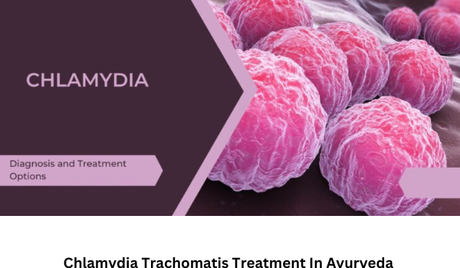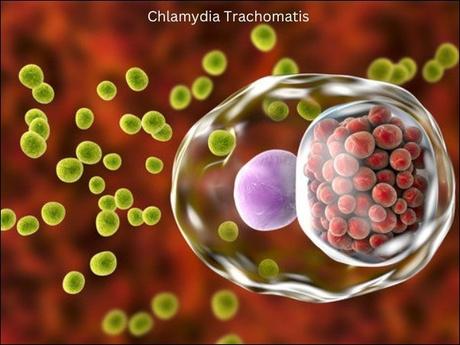
Abstract
Chlamydia trachomatis is a type of bacteria that can cause sexually transmitted infections (STIs) in both men and women. It is one of the most common bacterial STIs globally, particularly among young adults. In many cases, chlamydia does not cause any symptoms, and people may be unaware that they have it. If left untreated, it can lead to serious health problems, such as infertility, ectopic pregnancy, and chronic pelvic pain.

Introduction
Chlamydia trachomatis is a gram-negative, obligate intracellular bacterium that infects humans. It is primarily transmitted through sexual contact and can also be passed from mother to child during childbirth, causing eye infections or pneumonia in newborns. Chlamydia can infect both men and women and can affect various parts of the body, including the cervix, urethra, anus, throat, and eyes.
Types
There are three types of Chlamydia trachomatis that can cause human disease
1. Trachoma
This type of chlamydia causes an eye infection that can lead to blindness. It is spread through contact with eye discharge from infected individuals.
2. Lymphogranuloma venereum (LGV)
LGV is a rare type of chlamydia that can cause a systemic infection, including swollen lymph nodes, ulcers, and abscesses. It is usually transmitted through anal intercourse.
3. Genital Chlamydia
This is the most common type of chlamydia that affects the genital tract, including the cervix, urethra, anus, and throat. It is spread through sexual contact with an infected individual.
Causes
Chlamydia is caused by the bacterium Chlamydia trachomatis. It can be passed on through sexual contact, which may include vaginal, anal, and oral sex. Chlamydia can also be transmitted at the time of birth from mother to child.
Symptoms
Many people with chlamydia do not experience any symptoms, and it can go unnoticed for years. However, if symptoms do occur, they usually develop within 1-3 weeks after exposure to the bacteria. Common symptoms of chlamydia include
- Pain or discomfort during urination
- Abnormal vaginal discharge
- Pain during sex
- Lower abdominal pain
- Rectal pain or discharge (if the infection is in the anus)
- Swollen lymph nodes
Signs
In women, chlamydia can cause abnormal vaginal discharge, bleeding between periods, and painful periods. In men, it can cause discharge from the penis and pain or swelling in the testicles. Chlamydia can also cause conjunctivitis (pink eye) if the eyes are infected during sexual contact.
Risk Factors
Anyone who is sexually active can get chlamydia. However, certain groups of people are at a higher risk of getting infected, including
- Young adults aged 15-24 years
- People with multiple sexual partners
- People who do not use condoms consistently during sex
- Men who have sex with men
- People with a history of STIs
- Pregnant women
- Newborns delivered to infected mothers
Diagnosis
Chlamydia can be diagnosed through a simple test that involves collecting a urine sample or swab from the cervix, urethra, anus, or throat. It is important to get tested for chlamydia regularly, especially if you are sexually active or have had unprotected sex. Early diagnosis and treatment of chlamydia can prevent serious health problems.
Complications
If left untreated, chlamydia can lead to several complications, including
Pelvic inflammatory disease (PID)
An infection of the reproductive organs that can lead to infertility or chronic pelvic pain.
Epididymitis
An inflammation of the epididymis (the tube that carries sperm from the testicles), which can cause infertility in men.
Ectopic pregnancy
A pregnancy that occurs outside the uterus, which can be life-threatening.
Infertility
Reactive arthritis
Joint pain and swelling that can occur several weeks after a chlamydia infection.
Increased risk of HIV transmission
People with chlamydia are more likely to contract and transmit HIV.
Treatment
Chlamydia is treatable with antibiotics. These antibiotics are highly effective and can cure chlamydia in most cases. However, like any medication, they can have side effects, including nausea, vomiting, and diarrhea.
Ayurvedic perspective
According to Ayurveda, chlamydia is caused by an imbalance of the pitta and kapha doshas. Pitta dosha represents the fire element, while kapha dosha represents the earth and water elements. The main Ayurvedic treatment for chlamydia involves balancing these doshas through a combination of diet, lifestyle changes, and herbal remedies.
The following shloka from the Charaka Samhita, an ancient Ayurvedic text, describes the causes of genital disorders, including chlamydia
"Yathārdhajit-priyavāditvāt, nāmitvāt, gāyitvāt, hāsyatvāt,asamayo na cha deśo vikaraḥ cha mārutasya"
This shloka explains that genital disorders can be caused by imbalances in the vata dosha, which is associated with the air element. The imbalance can be caused by various factors, such as excessive talking, laughing, and singing.
Herbal Remedies for Chlamydia trachomatis by Planet Ayurveda
Planet Ayurveda offers a range of herbal remedies for chlamydia. These remedies are made from natural ingredients and are free from any chemicals or additives. Here are some of the products that can be used to treat chlamydia
Product List
- Female Health Support
- Kaishore Guggul
- Chandraprabha Vati
- Neem Capsules


Product Description
1. Female Health Support
This herbal remedy contains a combination of herbs, including Shatavari (Asparagus racemosus), Lodhra (Symplocos racemosa), and Ashoka (Saraca indica). These herbs help to balance the hormones and regulate the menstrual cycle.
Dosage- The recommended dose is 1 capsule twice daily.
2. Kaishore Guggul
Kaishore Guggul is a potent Ayurvedic formulation that contains herbs like Guduchi (Tinospora cordifolia), Amalaki (Emblica officinalis), and Haritaki (Terminalia chebula). These herbs have anti-inflammatory properties and help to detoxify the body.
Dosage- The recommended dose is 2 tablets twice daily.
3. Chandraprabha Vati
Chandraprabha Vati is a classical Ayurvedic formulation that contains herbs like Shilajit (Asphaltum), Guggul (Commiphora mukul), and Vacha (Acorus calamus). These herbs help to balance the doshas and strengthen the immune system.
Dosage- The recommended dose is 2 tablets twice daily.
4. Neem Capsules
Neem (Azadirachta indica) is a well-known herb in Ayurveda for its antibacterial, antiviral, and antifungal properties. Neem capsules from Planet Ayurveda are made from pure neem extract and can help to fight chlamydia.
Contact Planet Ayurveda Support Team to provide you the costing / ordering and delivery information at - [email protected] or Call at 0172-521-4030 (India), +91-172-521-4030 (Outside India) or Whatsapp at (+91) 9915-593-604Dosage- The recommended dose is 1 capsule twice daily.
Conclusion
Chlamydia is a common sexually transmitted infection that can cause serious health problems if left untreated. It's important to practice safe sex and get regular check-ups if you're sexually active. Herbal remedies from Planet Ayurveda, such as the ones mentioned above can be effective in treating chlamydia. However, it's important to use these remedies under the guidance of a qualified Ayurvedic practitioner.

